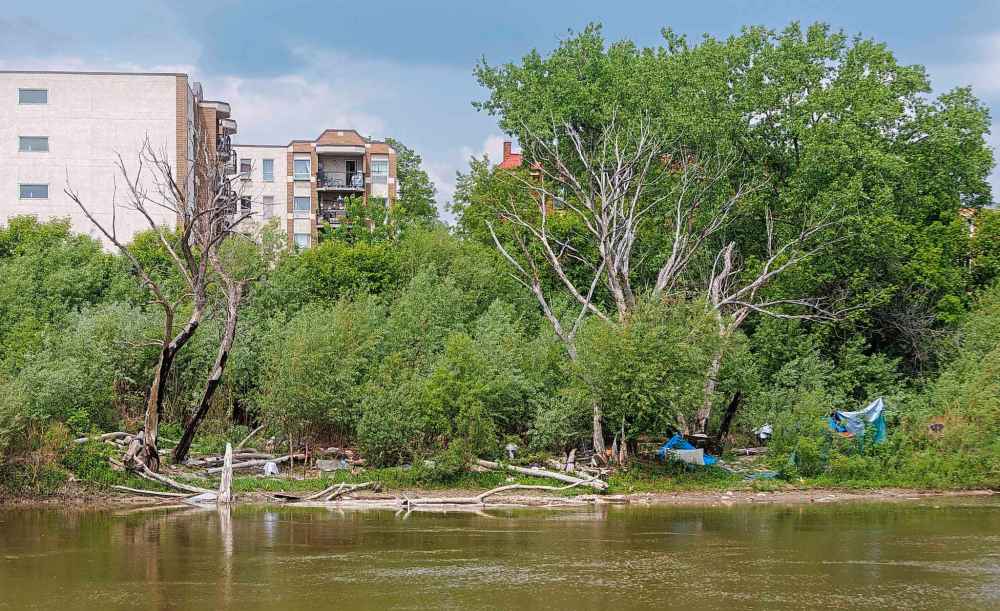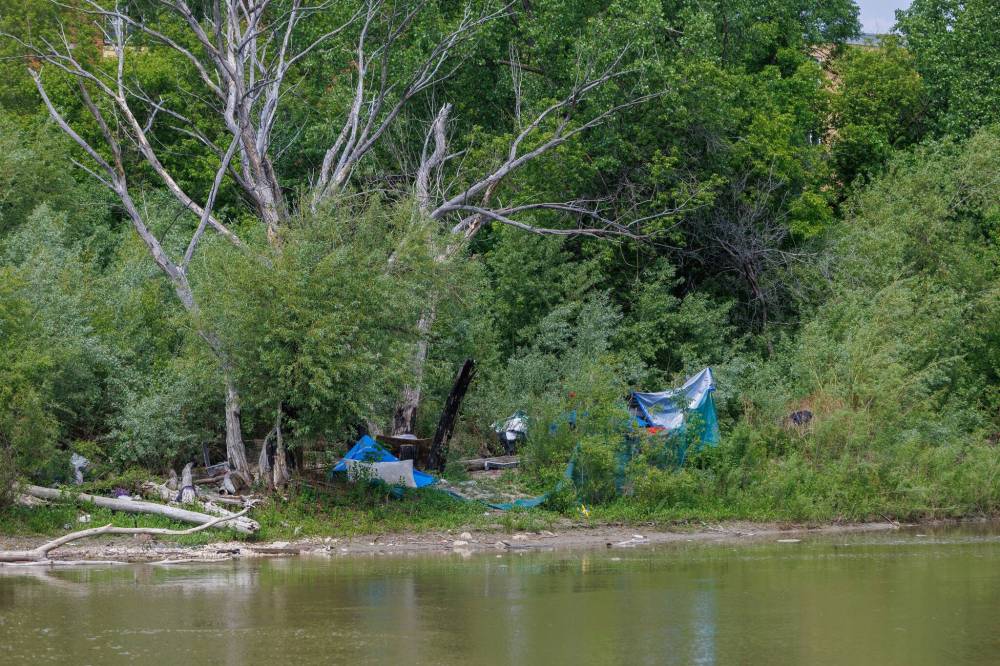‘You can’t force people into housing’
Residents, advocates say trust issues, strict rules, red tape keep encampments up
Advertisement
Read this article for free:
or
Already have an account? Log in here »
To continue reading, please subscribe:
Monthly Digital Subscription
$0 for the first 4 weeks*
- Enjoy unlimited reading on winnipegfreepress.com
- Read the E-Edition, our digital replica newspaper
- Access News Break, our award-winning app
- Play interactive puzzles
*No charge for 4 weeks then price increases to the regular rate of $19.95 plus GST every four weeks. Offer available to new and qualified returning subscribers only. Cancel any time.
Monthly Digital Subscription
$4.99/week*
- Enjoy unlimited reading on winnipegfreepress.com
- Read the E-Edition, our digital replica newspaper
- Access News Break, our award-winning app
- Play interactive puzzles
*Billed as $19.95 plus GST every four weeks. Cancel any time.
To continue reading, please subscribe:
Add Free Press access to your Brandon Sun subscription for only an additional
$1 for the first 4 weeks*
*Your next subscription payment will increase by $1.00 and you will be charged $16.99 plus GST for four weeks. After four weeks, your payment will increase to $23.99 plus GST every four weeks.
Read unlimited articles for free today:
or
Already have an account? Log in here »
Hey there, time traveller!
This article was published 30/05/2025 (221 days ago), so information in it may no longer be current.
Tents, tarps, and makeshift shelters line the beaten path along the Assiniboine River near Balmoral Street in West Broadway — a community hidden in plain sight.
At first glance, the scene could be mistaken for a Manitoba summer festival: there are colourful tents, birds chirping overhead, and geese with their goslings feeding nearby. The natural beauty of the river view masks the harsh truth.
The mattresses, shopping carts, broken glass, empty naloxone kits and food wrappers break the illusion. This isn’t a weekend retreat. This is home.
Curtis, a 44-year-old who is originally from Saskatchewan, wears a black Red River College nursing program zip-up hoodie. He has been without a home for the past six or seven years.
He says he’d move into permanent housing “today, if I could.” But walking away from his camp family — and the freedom of life outside of society — isn’t easy.
“It’s abandonment,” he said. “I’d feel like I’m leaving them behind.”

That feeling runs deep for Curtis, who says he knows the pain of separation. The father of four hasn’t seen his children since his own father died four or five years ago.
“Living in the white society is really tough being a native — an Indian, a savage, a scrub,” he says. “That’s what we’ve been called for hundreds of years, and for hundreds of years more, it will be the same.”
He questions why there’s homelessness in a country such as Canada, and how people can go about their business.
“The most richest city in Canada — Vancouver — they have a whole street full of homeless people. How is that possible?” he said. “How does the richest city allow a whole street to be homeless?”
He also offers insight into why many people stay outside, pointing to friends evicted from government-supported housing for breaking strict rules — including having visitors.
“It’s hard to abide by the rules of a situated house,” Curtis said. “We’re free. There’s freedom (living unsheltered) right here.”
For many in Winnipeg’s encampments, the path to housing is far from straightforward. Trauma, addiction and complex life circumstances often stand in the way of simply finding a bed.
Curtis says he was supposed to start a job on Monday, but he didn’t show up.
“I hadn’t really slept for two to three weeks… because of my drug of choice,” he said, holding a cloudy glass pipe in his hand.
“Choices and consequences,” he says, repeating those three words often.
Mentioning the NDP government’s two-year, $20-million Your Way Home strategy earns mixed reviews among the unsheltered. Some seem eager for the province to accelerate its pace, while others remain skeptical it will change anything.
“There’s a huge trust issue,” says another woman. “Trust is a big thing. Technically, I think everybody wants housing, but there’s peace of mind. It boils down to rules and regulations.”
“Domestication,” says another man, who refuses to elaborate out of anger.

Main Street Project declined to comment, instead pointing the Free Press to its public educational material that explains why some people avoid shelters.
“People may experience barriers to accessing shelters or choose not to go,” the 18-page document says. “Barriers may include shelters being at capacity; having restrictions on pets, belongings or alcohol; separating couples; or requiring detailed intake criteria or processes.
It also notes that people avoid shelters due to past experiences of violence, crowding, stigma, and safety concerns.
“There’s never going to not be encampments.”–Al Wiebe
Al Wiebe, who was homeless for 29 months and later became an advocate, says the reasons are many.
“They have to feel respected, and they don’t right now,” he says. “There needed to be more consultation. And the rhetoric about shutting down encampments, people’s homes… there’s never going to not be encampments,” says Wiebe, who recently received the King’s Coronation Medal for community service.
Wiebe says encampment communities keep people alive.
“You can’t force people into housing; they will leave housing,” Wiebe says, adding that soon the province will likely learn the approach is flawed.
A few blocks west of the riverside, a small encampment is tucked into a park, partially hidden by bushes.
A woman says she’s been on a housing waiting list for years, struggled with obtaining proper ID and related delays forced her to survive outside.
“I hate living like this,” she says, adding she’s been on the streets for the past three years.
Premier Wab Kinew said during question period Wednesday, not far from where the woman lives, that it could take six to seven years to repair the damage he accused the former PC government of causing.
Kinew added that MSP has housed 37 of the 40 people who have left encampments to date. The province has said it wants to move about 700 people from encampments into housing.
“I hate living like this.”–Encampment resident
The woman says she’s grateful for organizations such as MSP and people in West Broadway who bring food, water, and supplies — even tarps to keep out the elements.
MSP’s outreach services, as outlined in its material, include essential items and relationship-building efforts.
“Each element is crucial in building meaningful relationships with people who have been repeatedly disappointed, and who have experienced so much systemic harm and oppression,” the document reads. “Something as simple as offering food and coffee to someone experiencing homelessness lays the groundwork for building critical trust.”

Last week, MSP came under fire when its outreach staff were recorded dragging tents and belongings to the riverbank in Point Douglas, another of the city’s encampment hot spots.
MSP declined to comment, referring only to a letter it sent in response to the Point Douglas residents committee, which was outraged by staff behaviour.
On Monday, Housing Minister Bernadette Smith directed MSP — one of the key players in the province’s Your Way Home strategy — and other service organizations not to move people into encampments.
“Going forward, it’s from encampment to housing. The Your Way Home strategy outlines that pretty clearly,” she said.
Back at the riverbank, some residents acknowledged they had received tents from shelters — though they didn’t name them.
“I’m grateful,” one person says.
scott.billeck@freepress.mb.ca

Scott Billeck is a general assignment reporter for the Free Press. A Creative Communications graduate from Red River College, Scott has more than a decade’s worth of experience covering hockey, football and global pandemics. He joined the Free Press in 2024. Read more about Scott.
Every piece of reporting Scott produces is reviewed by an editing team before it is posted online or published in print — part of the Free Press‘s tradition, since 1872, of producing reliable independent journalism. Read more about Free Press’s history and mandate, and learn how our newsroom operates.
Our newsroom depends on a growing audience of readers to power our journalism. If you are not a paid reader, please consider becoming a subscriber.
Our newsroom depends on its audience of readers to power our journalism. Thank you for your support.
History
Updated on Friday, May 30, 2025 6:58 AM CDT: Fixes cutline














